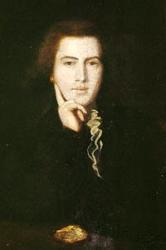Planning worship?
Check out our sister site, ZeteoSearch.org,
for 20+ additional resources related to your search.
- |
User Links
Person Results
Hans G. Nägeli

1773 - 1836 Person Name: H. G. Nægeli Composer of "[The heav'n of heav'ns cannot contain]" in The Sabbath School Hymnal, a collection of songs, services and responses for Jewish Sabbath schools, and homes 4th rev. ed. Johann G. Nageli (b. Wetzikon, near Zurich, Switzerland, 1773; d. Wetzikon, 1836) was an influential music educator who lectured throughout Germany and France. Influenced by Johann Pestalozzi, he published his theories of music education in Gangbildungslehre (1810), a book that made a strong impact on Lowell Mason. Nageli composed mainly" choral works, including settings of Goethe's poetry. He received his early instruction from his father, then in Zurich, where he concentrated on the music of. S. Bach. In Zurich, he also established a lending library and a publishing house, which published first editions of Beethoven’s piano sonatas and music by Bach, Handel, and Frescobaldi.
Bert Polman
Hans G. Nägeli
Thomas Tallis

1505 - 1585 Composer of "TALLIS' ORDINAL" in The Chapel Hymnal Thomas Tallis (b. Leicestershire [?], England, c. 1505; d. Greenwich, Kent, England 1585) was one of the few Tudor musicians who served during the reigns of Henry VIII: Edward VI, Mary, and Elizabeth I and managed to remain in the good favor of both Catholic and Protestant monarchs. He was court organist and composer from 1543 until his death, composing music for Roman Catholic masses and Anglican liturgies (depending on the monarch). With William Byrd, Tallis also enjoyed a long-term monopoly on music printing. Prior to his court connections Tallis had served at Waltham Abbey and Canterbury Cathedral. He composed mostly church music, including Latin motets, English anthems, settings of the liturgy, magnificats, and two sets of lamentations. His most extensive contrapuntal work was the choral composition, "Spem in alium," a work in forty parts for eight five-voice choirs. He also provided nine modal psalm tunes for Matthew Parker's Psalter (c. 1561).
Bert Polman
Thomas Tallis
Ludwig van Beethoven

1770 - 1827 Composer of "ANASTASIA" in Christian Chorals A giant in the history of music, Ludwig van Beethoven (b. Bonn, Germany, 1770; d. Vienna, Austria, 1827) progressed from early musical promise to worldwide, lasting fame. By the age of fourteen he was an accomplished viola and organ player, but he became famous primarily because of his compositions, including nine symphonies, eleven overtures, thirty piano sonatas, sixteen string quartets, the Mass in C, and the Missa Solemnis. He wrote no music for congregational use, but various arrangers adapted some of his musical themes as hymn tunes; the most famous of these is ODE TO JOY from the Ninth Symphony. Although it would appear that the great calamity of Beethoven's life was his loss of hearing, which turned to total deafness during the last decade of his life, he composed his greatest works during this period.
Bert Polman
Ludwig van Beethoven
William Drennan

1754 - 1820 Person Name: William Drennan, 1754-1820 Author of "The heav'n of heav'ns cannot contain" in The Chapel Hymnal Drennan, William, M.D., b. at Belfast, May 23, 1754, and educated at Glasgow, where he graduated M.A. in 1771, and M.D. 1778. He subsequently practised at Belfast. He died Feb. 5, 1820. In 1815 he published Fugitive Pieces in Prose and Verse, Belfast, 1815; and his Poems were collected and published with a Memoir by his sons in 1859. Of his poems six are grouped under the heading of "Religious Poems." Seven hymns, including five of these "Religious Poems," were contributed to Aspland's Unitarian Selection, 1810; but in the 1859 Poems and Memoir most of them are in a longer form.
As most of these are still in common use amongst the Unitarians in Great Britain and America, we subjoin the list of first lines:—
1. All nature feels attractive power. Law of Love.
2. Bless’d who with generous pity glows. Charity.
3. Humanity! thou sent of God. Faith, Hope, Charity.
4. In this fair globe, with ocean bound. Love of God.
5. O sweeter than the fragrant flower. Being Good.
6. The heaven of heavens cannot contain. Divine Worship.
7. The husbandman goes forth afield. Fruits of Benevolence. [William T. Brooke]
-- John Julian, Dictionary of Hymnology (1907)
William Drennan
Alfred Pettet
1785 - 1845 Person Name: Alfred Pettet (c. 1785-c. 1845) Harmonizer of "HERSCHEL" in The Oxford Hymn Book
Alfred Pettet
Frederick William Herschel
1738 - 1822 Person Name: Frederick William Herschel (1738-1822) Composer of "HERSCHEL" in The Oxford Hymn Book
Frederick William Herschel


 My Starred Hymns
My Starred Hymns


